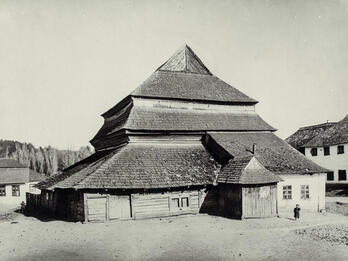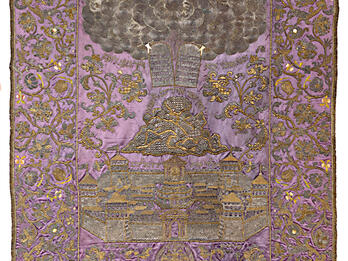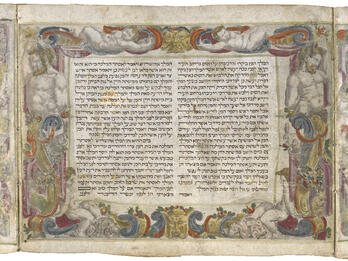‘Olam hafukh (The World Upside Down)
Although the troubles worsened and the city of Padua was in a state of turmoil [see Esther 3:15], there remained hope and divine mercy for the Jews, as not one person in the ghetto was dead or ill. However, this led to increasing jealousy toward us on the part of the gentile majority. We were afraid of them, as they tried to accuse us of removing our dead. The health officers were aware that this was an outright fabrication, but even so they instructed us to conduct a census so that they would know the number of Jews. Although we did not like this idea at all, the officers gave us no choice and therefore we collected a coin for each head—a sum that was distributed to the poor—and it turned out that we numbered 721 people.
The provveditore1 subsequently decreed that Jews could not engage in any commercial transactions. Seeking to reverse the decree with regard to selling, we argued before him that since, until now, there had not been even a hint of the plague in our district, why should we not be allowed to sell our wares. He acquiesced, and we then unequivocally forbade all purchases. In order to supervise this matter, we decided to assign every day, by lottery, five married men, who were at least twenty-five years old, two of whom would be posted from dawn to dusk at the two entrances to the ghetto that faced San Urbano, while the other three would each be positioned at one of the other three entrances. If one of these men were to see a stranger entering the ghetto with money, he should gently try to persuade him to retrace his steps. If he was unable to get him to turn around, he should make sure to send a Jew after him to see if he left by some other entrance or if he went into a Jewish store. He should then inform one of the four of us, so that we could investigate the money that had come into that Jewish shop. A man who was selected by lottery to stand at the entrance would be allowed to appoint another to replace him only with the permission of the four of us. We then decreed that all unmarried men must come to pray outside the Ashkenazic synagogue, in the synagogue courtyard, while the Italians must be in the women’s section, in order to space out the worshipers. We ordered that the Sabbath prayers should also be conducted at the break of day, before it gets too hot.
At that point, the wife of the gentile gatekeeper of the ghetto became infected, as she developed a boil under her knee, and he was placed under quarantine. His daughter also took ill, but her condition was unclear. After twenty days, the doctor in charge of health ruled that the sickness was not contagious and that he should be let in. But we refused to open for him the door to his house that was on the side of the ghetto; instead, he came in and out via the entrance outside the ghetto. We instructed him to refrain from entering the ghetto for a few days, and the same stricture was applied to his wife and children, and we told him that we would still pay him his salary and treat him well. However, his boy continued to come into the ghetto to play with the local children in his usual manner, and the gatekeeper himself was not strict in his compliance. Many claim that this was the source of the evil which subsequently befell the ghetto, as he too soon became infected, and it is known that his wife and children developed other infections over time.
On the fifteenth of Iyyar, Chiara, a granddaughter of Joseph Trieste, beadle of the holy community, took ill with a sickness that resembled paralysis, as she was unable to move or speak. Joseph was placed in quarantine, together with his entire family. He requested that he, along with his two grandsons, should be quarantined in his shop, which is near the holy Ashkenazic synagogue. I was inclined to agree, but my three colleagues were unwilling to listen, and they forcibly closed them up in their house. For he had been a stubborn man from his youth, and had been involved in dealings with the corazzieri.2 It is widely rumored that this Joseph had bought contaminated goods from them, to his own detriment and that of the entire ghetto, as those corazzieri came here from Verona and virtually all of them were struck by the plague.
This Chiara clung to life for about eight days, until she died. No boils could be found on her body, but only small black spots. The doctor appointed by the health ministers to examine the dead ruled that she was killed by the plague. This was indeed the case, as shortly afterwards twenty-six people from the household of that Joseph died from the pestilence, while five others became infected, but they recovered.
The task of the doctor, as imposed upon him by the health ministers, was as follows: whenever a death occurred in the city, the doctor would come, accompanied by a scribe from the health ministry, and the members of the house would bring out the dead, naked as on the day he was born. They would turn him over, in accordance with the doctor’s instructions, and he would peer at the body and examine it thoroughly from afar.
On the following day, Lifat da Udine died; she was an elderly woman who had been on her deathbed for a long time. When the doctor of the health ministry examined her and did not find any sign of the plague on her body, she was given a normal burial.
During Chiara’s illness, the four of us sought to hire four buriers who would take care of the dead and submit to quarantine, but despite our efforts we could find only two brothers—the honorable Meir and Leib, the sons of R. Michael Alatrini—who agreed to be buriers for fifteen ducats a month, in addition to their wages for digging the graves. They were quarantined in a house within the courtyard, near the Volto Gate, on the western side, which they rented from rabbi Jacob Lattarino. Its windows faced outside the ghetto, toward a home of townsfolk from the Soli family. On the following Sabbath, Samuel, son of R. Elḥanan Archevolti, also agreed to serve as a burier, for the same wages as the others, and he was quarantined together with them. We then hired a porter and his wife, at five ducats a day for the pair of them. They too were quarantined, in a house situated across from that courtyard, where the wife of R. Israel Katz had been living, and he gave her another apartment. We liked the idea, and she went willingly, as she was afraid for herself and her household to remain near the buriers, and the entrance to that courtyard was then welded shut. [ . . . ]
We unanimously selected R. Mordechai Bedi’at3 to seal off the homes of the infected. They would bring any difficult case to those appointed over that section, who would instruct them on what they should do.
The four sections of the ghetto were as follows: the first was from the San Urbano Gate, which faced the market, to the main street, including the two courtyards. This section was apportioned by lottery to the honorable R. Zeraḥ ha-Kohen. The second was from the main street until the end of the adjacent portico, and the whole path that ran from that end until San Canciano Gate. That section fell into my portion. The third was from the other San Urbano Gate until the end of the portico that extended from there until right of the Volto Gate. His honor, R. Moses Garasitto, of blessed memory, received this section through the lottery. The fourth section covered the area from the left side of the Volto Gate until the San Giuliana Gate, and the lottery apportioned it to Azriel Katz.
On the third of Sivan, all members of our community, quickly and without hesitation, closed up their finest possessions in special rooms in their homes, which they sealed with the seal of the health authorities, and the keys to these rooms were deposited in the health offices. Garasitto, of blessed memory, the honorable Azriel Katz, and I myself, the youngster of the group, were the first to do so. Had this step not been taken, nothing from the community’s property would have survived in all the travail that subsequently befell us. I also cleared the house of all large objects, which I placed in a large, rented attic outside of my house. Many people deposited boxes full of money in rooms belonging to others, in an effort to save them from the pestilence.
On that day, we in the committee assessed the proposal regarding the two thousand ducats—which we had borrowed from the minister Miguel for the purpose of lending it to individuals for silver, gold, pearls, tin, and copper—that it should be lent out in exchange for other items. We decided that three members of the committee should be appointed; two of the three should appraise each collateral and anything of sufficient value to ensure the loan, and that we should give to each person that which is written for him. In his mandate, signed by all three of them. In any case, great care should be taken with a collateral that the third party appraises as worth more than the loan. Also, a ban, excommunication, and ostracism were decreed upon anyone who had silver, gold, pearls, tin, or copper to give as collateral instead of other objects. The proposal was kept by seventeen yes votes against four no votes; and it was duly carried out, with all the collaterals brought into a room that was sealed off, as described above.
On that day, Chiara, daughter of Joseph Trieste, died from the pestilence, which also spread into the home of Jacob Lustro, and a boy from the Almagià family passed away on the following day. With the wife and daughter of this Lustro both ill with the plague, he could not find a man or woman to feed the sick. He cried out to us, asking why we couldn’t persuade people living on charity to serve them for a proper, fair wage. We approached a woman, one of the wives of those who receive charity, but they all refused, until he was finally able to hire Dolce Castelfranco and her daughter for one hundred ducats. His wife and daughter subsequently died, and he and his son were also quarantined in a large room that he had recently built, where he was spared. During that period, his whole household went down with the plague and they all died, except their leader, who recovered, and his son, who did not get infected. Their gentile maid was also struck with the pestilence, and with the permission of Signor Ettore Sala, who was appointed over the ghetto by the provveditore, she was taken to the gentile quarantine house. May the Lord remember this minister for the good, as he treated us well—he gave us everything that we requested from him.
Then three people from the Minkin household took ill, and they hired a gentile caregiver for fifty ducats to stay in their home, as at the time only two brothers were engaged by the health ministers, and they were very fully occupied in handling all the invalids. But shortly afterwards, that caregiver was also struck by the pestilence and he returned home, where he died, and they hired another caregiver.
Notes
[Health official.—Trans.]
[Italian honor guards.—Trans.]
[Likely a pseudonym. Perhaps his real name was Della Badia.—Trans.]
Credits
Published in: The Posen Library of Jewish Culture and Civilization, vol. 5.





